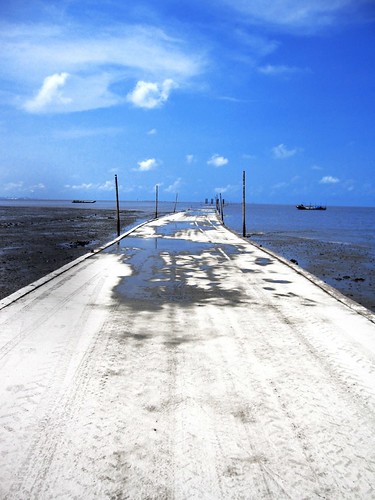
“Our future lies in China and one of our goals is to develop this rapidly expanding market”--Giant CEO, Anthony Lo (2011)
Despite all the glad handing and praise the bicycle industry is facing some serious challenges in the short to medium term. There are increasing signs that things are not all well in paradise despite the passage of the Economic Cooperation Framework Agreement (ECFA), which was rapidly pushed through Taiwan's legislature and signed by Taiwanese and Chinese representatives in 2010.
“The markets are changing so fast that the rules have been reset, and if we don’t catch up, it is going to be harder for us to hold our own in the global market,”--Giant CEO, Anthony Lo (2013)Aside from the chemical and mechanical doping scandals that have plagued the professional peloton--bicycling's advertising juggernaut--and possibly squelched interest in the sport, brands have been looking toward new technologies to buoy the industry and churn profits in a sluggish year. Shimano had been a major proponent of disc brakes in the pro ranks for some time and had been expecting reap the benefits. Now with both the UCI and the French Cycling Federation banning the components, a major source of market stimulation has been destabilized.
Shimano profits are down 20% in the first quarter of 2016, and SRAM is tightening its belt with layoffs due to flagging sales. SRAM's plan to layoff 40 employees deemed "redundant" by the company will be spread over the company's global business, including the United States, Europe and Asia.
“No one ever wants to be in position to request that people leave an organization, but sometimes it has to happen. I am confident that this restructuring positions us where we need to be and puts us on a firm foundation to drive forward into an evolving bike market.”--SRAM President, Stan DayWholesalers carry too much inventory into the first quarter, with the new product year looming (what is it now, May?).
The lack of sales growth over last year is worrying in light of better weather conditions in much of the country this year. The Upper Midwest and Northeast were slammed with heavy snows in early 2015 but saw better conditions this year. However, the BPSA figures show that sales to retailers in January and February still lagged, though March wholesale sales showed a 6 percent improvement over 2015.
Suppliers are seeing slow road and cruiser shipments at the start of the year, with road bike sales falling 9 percent overall. But mountain bike shipments are up 13 percent, and hybrid and commuter are up 16 percent.
Giant Global Group plans to increase its investment to build a bicycle plant in Kunshan, which has gained great support from the mayor of Kunshan Guan Aiguo. The 40-hectare new plant will consist of plants for bicycles, frames, carbon fiber and electrical vehicles. Besides, the cycle track & bicycle theme park plan will also be pushed forward. The investment in the initial stage amounts to USD 36 million (NTD 1.16 billion).
Sources revealed Giant Global Group currently possesses a bicycle plant in Kunshan with an annual output of 2.5 million. As the Group's largest manufacturing base in the mainland, the plant boasts about 50% of the products meeting the domestic market demands. After being put into operation, the new plant will meet the market demands for both GIANT and MOMENTUM and the plant will trade with Taiwan bicycle plants after the signing of ECFA.
Taiwan’s economy contracted on a yearly basis for a second straight quarter as China’s economic slowdown dragged on the island’s exports.
Gross domestic product fell 0.28 percent in the three months through December from a year earlier, according to preliminary data released by the statistics bureau Friday. That compares with a 0.6 percent drop projected by the median estimate in a Bloomberg survey of economists and the 0.63 percent decline in the third quarter. The economy grew 0.85 percent in 2015.
Taiwan’s exports shrank last year as local manufacturers grappled with the double whammy of slower economic growth in their top market China and tougher competition from mainland rivals. It wasn’t all bad news though: The economy grew 3.22 percent at a seasonally adjusted annualized rate, the most since the third quarter of 2014, as lower crude prices helped consumers.
Exports totalled USD 22.2 billion in January, which represented a notable 13.0% contraction in year-on-year terms. January’s result represents a slight improvement over December’s 13.7% drop. Imports tallied a total of USD 18.7 billion in January, which was a sharp 11.7% fall over the same month of last year. The figure came in above to December’s 14.8% decline.
FocusEconomics Consensus Forecast panelists expect exports to fall 0.6% in 2016 and to rise 3.9% in 2017.
Following legislation in Beijing, Shanghai and Guangzhou, it has been reported that Shenzhen may also start to limit the use of electric bikes. Chinese people are getting wealthier and buying more and more cars, which as we know has caused many problems, such as heavy traffic, serious air pollution and poor physical health in big cities. In fact a highly viable alternative to fossil fuel powered vehicles is already available; bicycles and e-bicycles together with public transit form a good system and a true solution to the problem.
The Chinese market for Taiwanese bicycles declined by 33% to 79,000 units. Though not yet that large, the Chinese market was seen as a main growth market for several years. This development has now stopped due to the economic decline in China.


